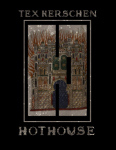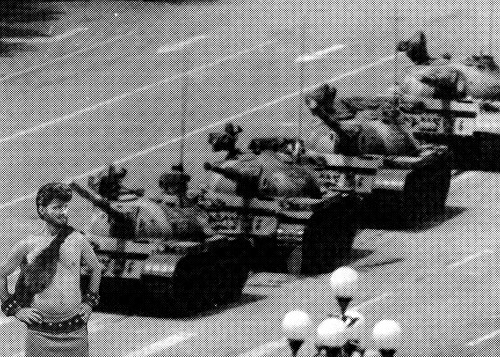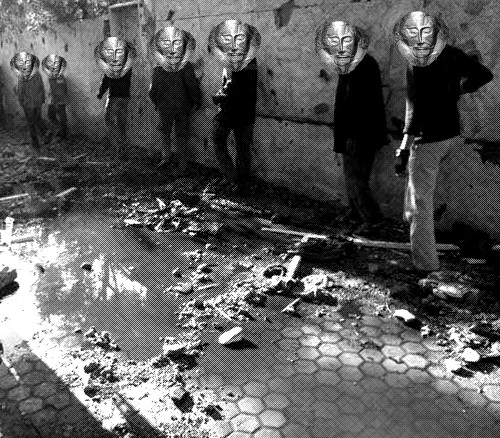 Hothouse
Hothouse
by Tex Kerschen
2011
84 pages / Free for download here
“Selections from the hothouse of the possible,” says the epigram to Tex Kerschen’s poetry collection, Hothouse. Recently, when I saw Kerschen read in Houston, he was accompanied by an opera singer, a six-year-old, a video installation and a smoke machine. As you might expect, he’s a gifted showman. That said, the possible Kerschen’s referring to doesn’t allude to stagecraft or even poetry, per se. Kerschen’s more ambitious than that. He wants to trick his readers into reconsidering what is possible.
It’s a soft sell. “Salvation sells itself,” these poems seem to say. “All I do is the paperwork.”
When Hothouse’s poems talk they drawl, unbalancing the reader with prolonged vowel sounds of narrative abstraction. At times they hold the reader at arm’s length; at times whisper in the reader’s ear with a hand in their hip pocket. By this sleight of hand Kerschen’s poems can look other than they are – seeming character studies in fatalism before surprising the reader with the possibility of redemption. They document the failings of human virtue and the plight of the human animal who toils and scratches in the aisles of 99 Cents Only Stores; searches for squandered youth in the clubs of Houston or Dublin to the ballads of Chamillionaire; retreats to the escapist fantasy of the Renaissance Festival and finds only wench-cleavage, neo-nazis and rigged jousting. But the purpose of this cataloging of human suffering is not, in fact, to simply bum you out. Like all good satire, it’s aim in enumerating humanity’s worst qualities is the restoration of human goodness: “I was all like / Where my dogs at? / They was all like, /At the pound / in a cage / waiting for a pinprick, / send magazines.”

Through Kerschen’s satirization of suffering – the probable, the predictable and the probably happening to the reader right now – the reader reevaluates how much more may be possible. In the process, some measure of convalescence from suffering is accomplished; as in the poem “Past Lives,” where several levels of narrative framing are at work to set up a joke, which may or may not be at the reader’s expense. The poem’s narrator recounts the high times had in Cleopatra’s court: “She was famous. I was rich. We traded gifts / of gold, lions and slaves.” When the listener (né reader) inquires about their own past life, they become the punchline: “Yes, you were there / You were cleaning up.” The direct address here implicates the reader in the poem, and thereby in the poem’s critique. Jokes on you. As Nietzsche’d say: only humans laugh, because only humans suffer so goddamn much they need a fucking laugh.
In Kerschen’s poems we suffer, because we know; and because we know, we can overcome suffering. But we don’t know everything, or more so, don’t allow ourselves to. Kerschen ties our unconscious knowing to animal instinct, signified in the bestiary of animals parading through these poems. Wild-life is a thing to be kept in check, a side of ourselves we to be suppressed. It’s the beard which grows back unbidden and must be shaved down anew each day, the dog in the cage. And yet it’s also this un-house-trainable aspect which offers emancipation from the cage; as an unexpected dolphin sighting does for two young lovers sitting on the beach burying their cigarette butts in the sand: “… I looked out at the water / and bit my tongue before telling you we wouldn’t / see dolphins, and there they were / beyond the swells / swimming in pairs / diving to eat / rising to breathe.” Kerschen, if not quite seeking reintegration, does encourage communion. “How many words should fit / on a line in a poem? / The time for half measures / has passed. Chance won’t see / that the dog gets fed.” The narrator hungers to know. The dog knows. It knows it’s hungry. But the only way either will eat Snausages tonight is to get a little work done.

Intermixed throughout Kerschen’s text are collages, concrete poems in Latin and images of medieval animal-human grotesques. This use of graphics and graphic text is most interesting as a reflection of mood, adding a mysticism and rejection-of-mysticism to Hothouse’s exploration of divisions within the self. The cut-out image of a magician, scissored to reveal strings affixed to the chair he levitates, and a mandala of Bad Boy Club logos, aptly depict Kerschen’s intersecting interests in themes of knowing, unknowing, and the satirization of a culture caught between the two. These graphics most fully manifest Kerschen’s promise of the possible when they experiment with text, as in a funny appropriation of purportedly Roman runes, renaming one line of the ancient symbols: “LIME. CINNABON. AND URINE”. And again, in an inverted pyramid of Latin. Roughly google-translated it reads, “WE CAN DO BETTER THAN THIS / WE DO BETTER THAN THIS / THAN THIS WE CAN / CAN,” possibly the most clear expression of Hothouse’s thesis.
In the collection, Kerschen doesn’t make any promises about the possible – what it is or isn’t. Defining it would negate its possibilities. Instead the possible comes into relief through Kershen’s descriptions of everyday drudergy. And besides you don’t get salesman-of-the-month status selling pragmatism; you get the top spot slangin’ dreams. Dreams are the cashcrop of Hothouse, infesting its fertilizer. Speaking of dirt, I may be burying the lead by only now mentioning that Kerschen’s day job is fronting the experimental noise band Indian Jewelry (hear: here, here, here). The fact is notable as more than CV filler. Conceptually, the group’s eight albums cop many of Hothouse’s best moves, but rather than attenuate their themes these reverberations add layers. When viewed hand-in-hand Kershen’s catalogue constructs a body of work and a voice worth listening for.
***
Hothouse is available for free download here.
Tex Kerschen’s new collection, Tidal Economics, is forthcoming on Girl Gang Books.
***
Jon Lindsey has an MFA from the California Institute of the Arts. He lives and writes in Houston, TX.
Tags: Hothouse, Jon Lindsey, Tex Kerschen
